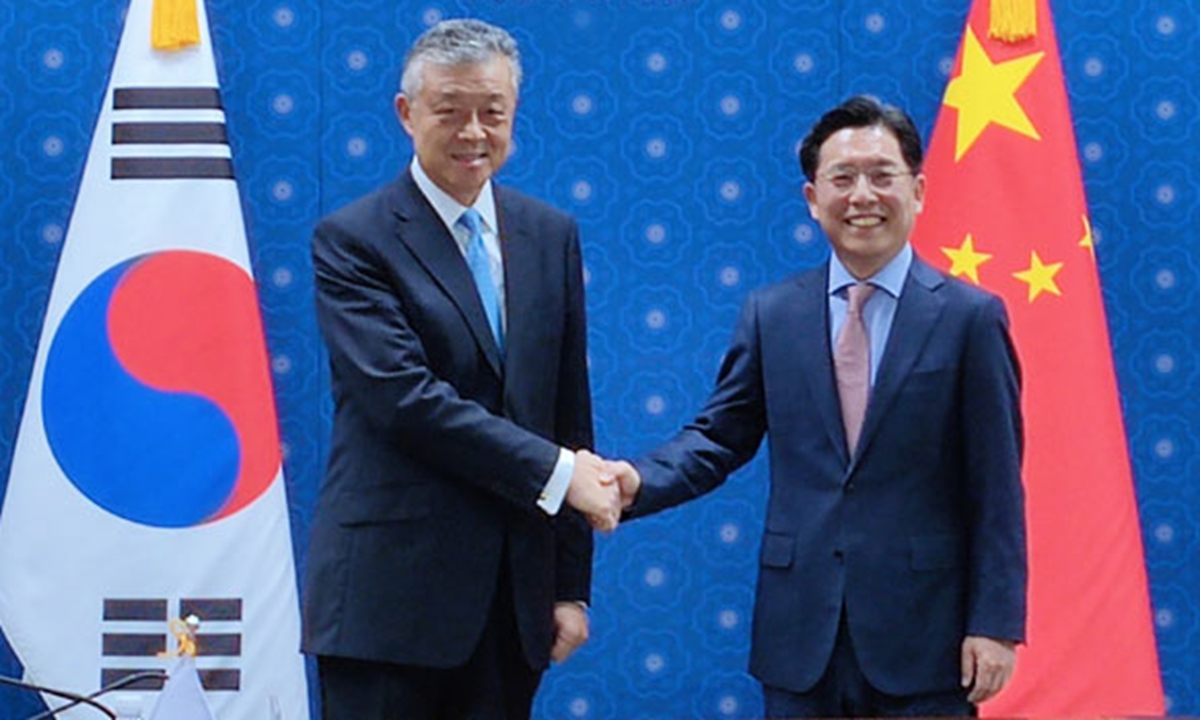
Photo: Website of Chinese Foreign Ministry
China's special representative on Korean Peninsula Affairs Liu Xiaoming expounded on China's stance on the issue and stressed that the country disapproves of actions by any party that could escalate the situation during his Seoul visit, which observers said "carries China's sincerest goodwill to play a constructive mediating role" as the Peninsula experiences rising tensions and the Ukraine crisis casts a shadow over regional and global security.
Visiting South Korea for the first time since being appointed the current position in April 2021, Liu made the remarks while meeting his South Korean counterpart Noh Kyu-duk on Tuesday, roughly a week before South Korean President-elect Yoon Suk-yeol's inauguration on May 10.
China is communicating with South Korea and will release information on China's senior representative's possible attendance to Yoon's inauguration, which is an important event of this friendly neighbor of China, according to Zhao Lijian, a spokesperson of China's Foreign Ministry, at Thursday's routine press briefing.
During Liu's meeting with Noh, the Chinese envoy expounded on China's position on the Korean Peninsula issue.
"China does not want to see an escalation of tensions on the Peninsula and disapproves of actions by any party that could aggravate the situation."
China shares similar positions and broad common interests on the issue with South Korea, supports South and North Korea in improving their relations, and commends the efforts made by the Moon administration and outcomes it achieved, Liu said.
China is prepared to strengthen communication and coordination with the incoming Yoon administration to jointly push forward the process of a political settlement of the Peninsula issue, Liu said.
Noh expressed South Korea's hope for the Korean Peninsula to remain peaceful and stable, calling on relevant parties to resume talks as soon as possible. He also said that South Korea is willing to strengthen cooperation with China on Peninsula affairs.
Da Zhigang, director of the Institute of Northeast Asian Studies at Heilongjiang Provincial Academy of Social Sciences, told the Global Times that Liu's South Korean visit was timely and crucial, and reflected China's responsible attitude in regional affairs given recent signals of rising tensions.
Yoon and his team had described the North in a hardline tone during the election campaign and after winning in early March. North Korea in late March launched an intercontinental ballistic missile, the first of its kind since 2017, while South Korea conducted rare missile drills and an F-35A display seen as "explicit response" to North Korea's missile test, according to the Reuters.
Da said China is expressing its sincerest goodwill to play a constructive role in bridging South and North Korea and create a positive atmosphere for the two sides to maintain benign contact and have political dialogue at a time when the Yoon administration's relevant policies are still taking shape.
Besides China-South Korea cooperation on the Peninsula issue, China is also a key player in multilateral mechanisms that are mediating the issue, Da said.
Before South Korea, Liu in April visited the UN headquarters in New York where he met Under-Secretary-General for Political and Peacebuilding Affairs Rosemary DiCarlo, Assistant Secretary-General for Humanitarian Affairs Joyce Msuya and permanent representatives of UN Security Council member states and exchanged views on the situation in the Korean Peninsula, followed by a trip to Europe carrying the same agenda.
Da noted a foggy future on the Korean Peninsula issue, as there are so many factors leading to rising tensions, including North and South Korea's actions, the ongoing Russia-Ukraine conflict and the role of the US.
There has been a shared consensus that the situation would worsen when Yoon takes office, though "the possibility cannot be ruled out that Yoon may soften the tough stance a bit" and act in favor of South Korea's true interests. If the tensions continue to escalate, that would jeopardize the stability of Northeast Asia and regional economic cooperation, hindering the implementation of RCEP, Da said.
The expert also warned of the risks of a "Ukraine crisis in Northeast Asia," considering the similarities in history, geopolitical realities and hype of external forces.
Another alarming development was South Korea's announcement Thursday that its state intelligence agency has joined a cyber defense group under NATO as the first Asian member amid the alliance's "Asianization" under the US.
The US, the root cause of the prolonged and complicated Korean Peninsula issue, should play a greater part in solving the problem, Da said, noting it remains to be seen how US President Joe Biden will address the issue during his visit to South Korea and Japan later this month.




